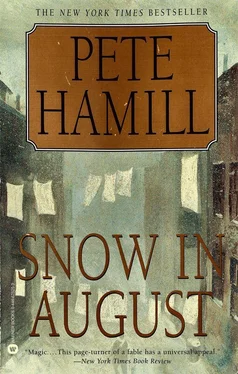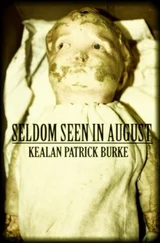“At least they’re not all a bunch of bigots,” she said. “There’s still a lot of decent people around here, no matter what you might think.”
They talked about how the police had to find the people with the red paint and how it was probably the Falcons, since Frankie McCarthy had come by with his boys to see the results. They usually ate breakfast when other people ate lunch.
“You don’t have to be Sherlock Holmes,” she said, “to figure that one out.”
But as this was Easter Sunday, and she wanted to make it special for the boy, she didn’t dwell on the story. It was one more terrible event in a sinful world. After dinner, they walked together to the Grandview, where she was working that night. This was a big deal for Michael: because there was no school on Easter Monday, he could sit through the entire double feature, along with cartoons, the newsreel, and the coming attractions, while Kate worked in the box office. And he would go home with her when the pictures were over. She took him through the lobby to a side door, bought him a box of Good and Plenty candies, and then went to the box office.
The first movie was a western with Joel McCrea, and although he missed the beginning, he felt as if he’d already seen it ten times at the Venus, with different actors. The other movie was 13 Rue Madeleine , with James Cagney, all about four OSS spies who infiltrated France to destroy a secret German rocket base before D day. The address in the title was Gestapo headquarters, and one of the OSS agents was secretly a German spy. Michael disappeared into the movie, training with Cagney, operating secret radios in barns and basements, moving bravely down dark European streets in a holy mission against the Nazis. When it was over, he felt uneasy. The swastikas were obviously symbols of evil, the Nazis were clearly the bad guys. How could anybody copy the Nazis by putting swastikas on a synagogue? Probably the Falcons. But maybe someone else. Maybe people right here in the RKO Grandview.
His feeling of unease worsened when the newsreel came on after the coming attractions, just before the Joel McCrea picture was to play again for the last time that night and he could see what he had missed. Part of the newsreel was about Jackie Robinson signing with the Dodgers. It showed Branch Rickey shaking hands with the smiling black player, and film of Robinson in Havana, slashing a ball to left field and dashing to first in a pigeon-toed way, his hat falling off as he rounded the base. Some people cheered. But about half the audience booed. In Brooklyn! They were booing a Dodger!
On the way home with his mother, he talked about the way Robinson had been booed, not because he was a Dodger, obviously, but because he was a Negro, and she tried to explain how there were all sorts of people in the world, and how some of them were ignorant or afraid or full of disappointment, and how you had to pity them and pray for them.
“They just don’t know any better,” she said. Then her voice lowered. “But, to tell the truth, some of them…”
She just shook her head, as they turned into Ellison Avenue for the last two blocks to home. The night sky was clear, bright with dense stars and a huge moon. There were more people in the streets now. The night was cool but not cold, with a brisk wind blowing up from the waterfront, and they were both glad they’d worn coats. A half-full trolley car raced by on its metal tracks. The bars of Fitzgerald’s and Casement’s were packed. They turned into the apartment house.
“We’ll have a nice cup of tea,” she said, “and then a good night’s sleep.”
On the second floor landing, as they passed Mrs. Griffin’s flat, Michael could hear the squeak and bang of the roof door. He was suddenly wary. He remembered clearly hooking it shut. He stepped ahead of his mother on the last flight of stairs and turned cautiously on the landing. He could see a rectangle of sky through the open door.
“Why is that thing open?” Kate Devlin said, fumbling for her key. “Go up and lock it, son.”
He went slowly up the roof stairs. When he reached the door, he could see it: a bright red swastika painted on the inside of the black door. Paint was splashed around the small landing.
“Mom! You better come up here, Mom!”
Coatless now, she left the apartment door open and hurried up the stairs.
“Good God,” she whispered.
She stepped outside, with Michael behind her. In the bright starlight they could see the words JEW LOVR painted on the outside of the door, the paint still wet to the touch. The words filled the door. There didn’t seem to be room for the E in LOVER.
“Those cowardly bums,” she whispered, then went back to the doorway. “Now be careful, don’t get the paint on yourself.”
She hooked the door shut and led the way downstairs. In the kitchen she pulled on her coat. Her face was cold and focused.
“That does it,” she said. “I’m calling the police.”
“They won’t do anything, Mom.”
“I’m calling them anyway. Lock the door behind me.”
From the window, he saw her cross Ellison Avenue and walk into the back door of Casement’s Bar, where there was a pay phone. I should have gone with her, he thought. Suppose they’re down there? Suppose the Falcons are watching her? If they do anything to her, it’s because of me. I’m the one who goes to see Rabbi Hirsch. I’m the one who went to get Father Heaney. Not her. He imagined men in black uniforms and polished boots coming out of the dark to hurt her. A phrase rose in his mind. Got shtroft, der mentsh iz zikh noykem . God punishes, man takes revenge. If they touched her, he would find them and kill them. No matter where they went, if they ran to the four corners of the world, he would find them. He didn’t care if he was caught. He didn’t care if they took him to the death house at Sing Sing and strapped him in the chair. Got shtroft, der mentsh iz zikh noykem …
And then he saw her come out of the back door of Casement’s and step between two parked cars. She ran across the street. In the kitchen, he unlocked the door and peered down the stairwell. He saw her hand on the banister, heard her quick steps, and then she was coming up the last flight and he took her hand and led her into the kitchen and locked the door.
“All right,” she said, removing her coat. “Let’s have our cup of tea.”
Two uniformed cops arrived about an hour later. One was beefy, gray-haired, and bored. He said his name was Carmody. The other’s name was Powers. His skin was the color of oatmeal. Their polite boredom made Kate Devlin seethe.
“Whatta ya want us to do about it, lady?” Carmody said. “Clean it off?”
“Investigate it!” she snapped. “There’s paint all over the floor up there. These idiots probably took the can to the roof and threw it into the yards. Maybe you could find the can. Maybe you can find the brush. Maybe you’ll even find fingerprints!”
“Well, well, a sleuth,” Carmody said. “We’ve found ourselves a sleuth, Powers.”
“Gee, we’d better do what the sleuth says,” Powers said.
Kate’s eyes narrowed to cold slits.
“Don’t get sarcastic with me, Officer. You’re here as a civil servant. You’d better be civil and you’d better be a servant.”
Carmody sighed in a mixture of surprise and surrender. Kate Devlin wasn’t like some of the Irish, who she once told Michael were far too docile in the presence of the police. Michael watched her with a kind of awe. Look at the way she was dealing with these shmucks. She was tough. Carmody took out a notebook and a stubby pencil and sat down heavily at the table, facing Kate Devlin. The other cop gazed around the apartment, peering into the darkened rooms off the kitchen.
Читать дальше












